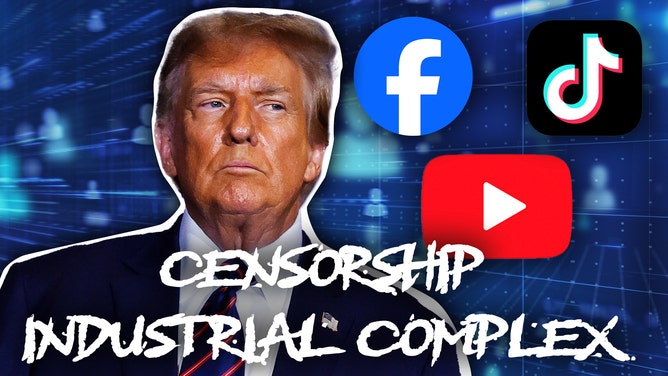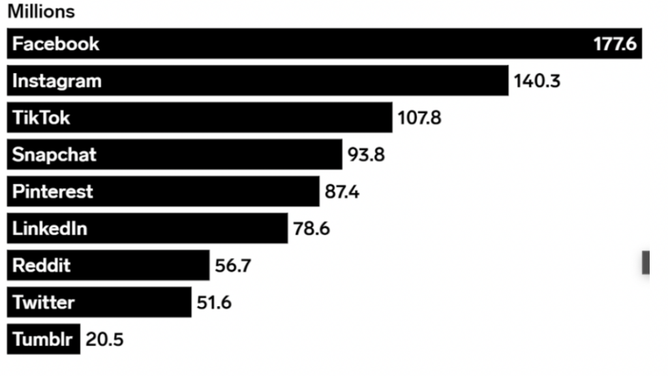Censorship Industrial Complex Looms Over 2024 Election As Trump Gains Momentum | Bobby Burack
Donald Trump will be the 2024 Republican nominee, barring incidents unforeseen. It is all but a formality. He is also the favorite to win the 2024 general election by most polls and estimates.
Yet looming over the election is interference by way of the censorship industrial complex, a network of government agencies that conspire to censor Americans for holding disfavored views.
By now, you are aware that social media companies interfered in the 2020 election by suppressing a New York Post exposé into Hunter Biden's corrupt international business dealings.
At least one in six Biden voters say they would have changed their vote had they been aware of the report's validity.
Meta CEO Mark Zuckerberg admits Facebook buried the report on behalf of the FBI, which had forewarned of incoming Russian propaganda weeks before.
"We just kind of thought, Hey look, if the FBI, which, you know, I still view as a legitimate institution in this country, it’s a very professional law enforcement. They come to us and tell us that we need to be on guard about something. Then I wanna take that seriously," said Zuckerberg in August 2022.
Republicans are aware of the measures taken to meddle in the election on Joe Biden's behalf. They complain about them often. But what have they done to prevent interference from occurring, again, in 2024?
They haven't done anything. At least not successfully.
And if you think there won't be interference this time around, you are part of the gambit.
The powers that be have made it their moral duty to prevent you from deciding whether Trump should or should not return to the White House.
They impeached him, indicted him, arrested him, and now seek to remove him from primary ballots. Damaging Trump's campaign is an obsession.
It's their religion.

And with more Americans than ever turning to algorithms for news and information, the censorship industrial complex is in position to manipulate more votes this year than in any election prior.
The alliance between government agencies and social media services runs deeper than perhaps even the supposed conspiracy theorists contend.
Memory-holed in the news cycle is a 103-page staff interim report that the House Judiciary Committee filed in November.
The report details the extent to which government agencies pressured tech companies to dictate the information posted on social media prior to the 2020 presidential election.
The finding discovered "hundreds" of reports showing how the Department of Homeland Security, Cybersecurity and Infrastructure Security Agency, Department of State, and Stanford University assisted in the creation of a secret "disinformation" group that asked social media companies to "censor true information, jokes, and political opinions."
Platforms like Facebook and Twitter acquiesced.
The pressure campaign disproportionately resulted in the de-platforming of information disfavorable to Democrats.
Of course, it did.
"This pressure was largely directed in a way that benefited one side of the political aisle: true information posted by Republicans and conservatives was labeled as 'misinformation' while false information posted by Democrats and liberals was largely unreported and untouched by the censors," the report said.
"The pseudoscience of disinformation is now – and has always been – nothing more than a political ruse most frequently targeted at communities and individuals holding views contrary to the prevailing narratives."
The relationship between the agencies and tech platforms continued following the 2020 election and is ongoing today.
Leaked internal documents show Andy Slavitt, former senior advisor to President Biden’s COVID response team, kept in touch with the heads of the services after Biden assumed the White House.
The documents confirm communications between Slavitt and social media executives, in which he urged the services to ban reporters who criticized how the Biden White House handled the pandemic.
"They really wanted to know about Alex Berenson," one Twitter employee wrote to another to describe a recent meeting with Slavitt.
"Andy Slavitt suggested they had seen data viz that had shown he was the epicenter of disinfo that radiated outwards to the persuadable public."
Twitter removed Berenson from the service shortly after.
We are also aware -- thanks to former press secretary Jen Psaki -- that the White House identified "problematic" posts for Facebook in 2022 to censor because they contained what the Biden admin deemed "misinformation."
A month later, Facebook announced it had removed over 20 million pieces of COVID "misinformation," including posts that doubted that mRNA vaccines could successfully stop the spread.
Now, Elon Musk's purchase of X, formerly known as Twitter, does complicate the gateway the Biden administration has to heads of big tech.
But only some.
X cannot, alone, counter the influence of Facebook, YouTube, TikTok, Instagram, and Google -- all of which reach far more American users than X.
Here's a chart comparing the number of users on X to its competitors, via eMarketer:

Consequently, big tech remains an asset that unilaterally and readily operates at the behest of one political party.
To understand how serious that development is, understand there are constitutional rules in place that are supposed to prevent government agencies from policing the speech of ordinary Americans.
The U.S. government does not have the legal ability to censor the public on behalf of the First Amendment.
Yet what we have is the government actively subverting the First Amendment by way of third-party social media platforms willing to censor content on their behalf.
That is, wholly, unconstitutional, as Daily Wire founder Ben Shapiro explained in an interview with OutKick in 2020:
"The fact that you now have the media and the Democrats pushing to police Facebook ... we need to be pushing back on that level because that actually is, in some cases, government-sponsored action," said Shapiro. "We have the White House telling Facebook to take things down. Now you’re looking at Facebook as an agent of the government. That’s a First Amendment case."
There are, technically, measures to combat the government from strong-arming private tech companies.
A Wall Street Journal legal analysis documents how citizens can sue private companies when they restrict First Amendment rights at the behest of government officials.
Lawmakers could also look to seriously upend Section 230 of the Communications Decency Act, which protects tech companies from liability, if they can prove they are operating as "state actors."
However, neither of those measures are underway or will be in time for the 2024 election.
And then there’s the legacy media, a faithful ally of the censorship industrial complex.
Television news networks have recently adopted a strategy in which they do not air Donald Trump's speeches in full so they can more easily mischaracterize what he says.
Earlier this month, MSNBC/NBC did not broadcast any of Donald Trump's victory speech following the Iowa caucuses. CNN cut in halfway through when host Jake Tapper told viewers he could not, in "good faith," continue to air the speech because Trump was "repeating anti-immigrant rhetoric" – which he was not.
Rather, Trump was addressing his plans to end illegal immigration – a topic Iowa caucus-goers saw as more important than the economy.
The networks censored the leading Republican candidate's message, understanding that campaigning against illegal immigration is a likely winning message.
They took the same approach during Trump's victory speech in New Hampshire last week.
That is voter manipulation. And that ought to have you alert.
Willfully intercepting voters' access to factual information is authoritarianism in its ugliest form. Government-induced censorship, not MAGA Republicans, is, by definition, a threat to Democracy – to use a popular phrase.
But the people in charge have no shame. The desired outcome is one-fold: prevent Donald Trump from winning the election at all costs, constitutional or not.
Like in 2020, they intend to.